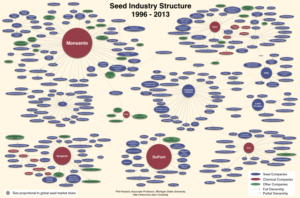
The seed industry is one of the most consolidated in agriculture, and it’s getting worse.
Bayer recently announced that it reached a merger agreement with Monsanto, which will create the world’s largest supplier in seeds and agricultural chemicals. DuPont and Dow, and ChemChina and Syngenta, have also announced agreements to merge. If the Department of Justice (DOJ) allows these three mega-mergers to move forward, three corporations will sell nearly 60% of the world’s seed. This level of concentration will have grave impacts on U.S. agriculture, including organic.
We know that consolidation in the seed industry leads to less choice for all farmers, regardless of what they grow and how they grow it. When it comes to the needs of organic farmers, they’re already underserved by this industry because the dominant players only invest in seed technologies and chemical production systems that are in conflict with organic farming practices. These companies also aggressively protect their intellectual property rights on seeds, which means less innovation and more restrictions on how seed is used and exchanged, including for research purposes and seed saving.
That’s why nine groups, including OSA, submitted petitions last week signed by 708,000 people urging the DOJ and elected officials to block these pending mergers. The signatures were submitted the same day that the Senate Judiciary Committee held a hearing to discuss this consolidation. Only two of the nine panelists who gave testimony objected to the mergers. This imbalance was a gross misrepresentation of how most farmers feel about the mergers. If you missed it, you can watch the hearing here and read a summary by the National Sustainable Agriculture Coalition.
We all need to speak up in opposition to these mergers and work to support policies and programs that expand seed choices for farmers, especially as we head into the next Farm Bill. If you’re not already on our newsletter list to receive timely action alerts, sign up here.

